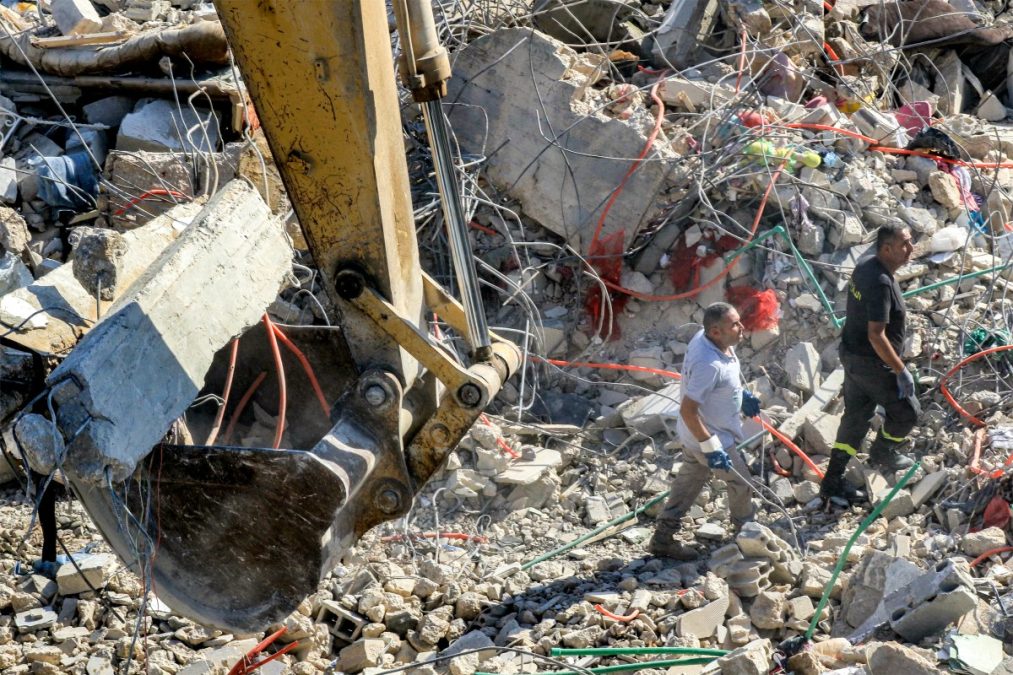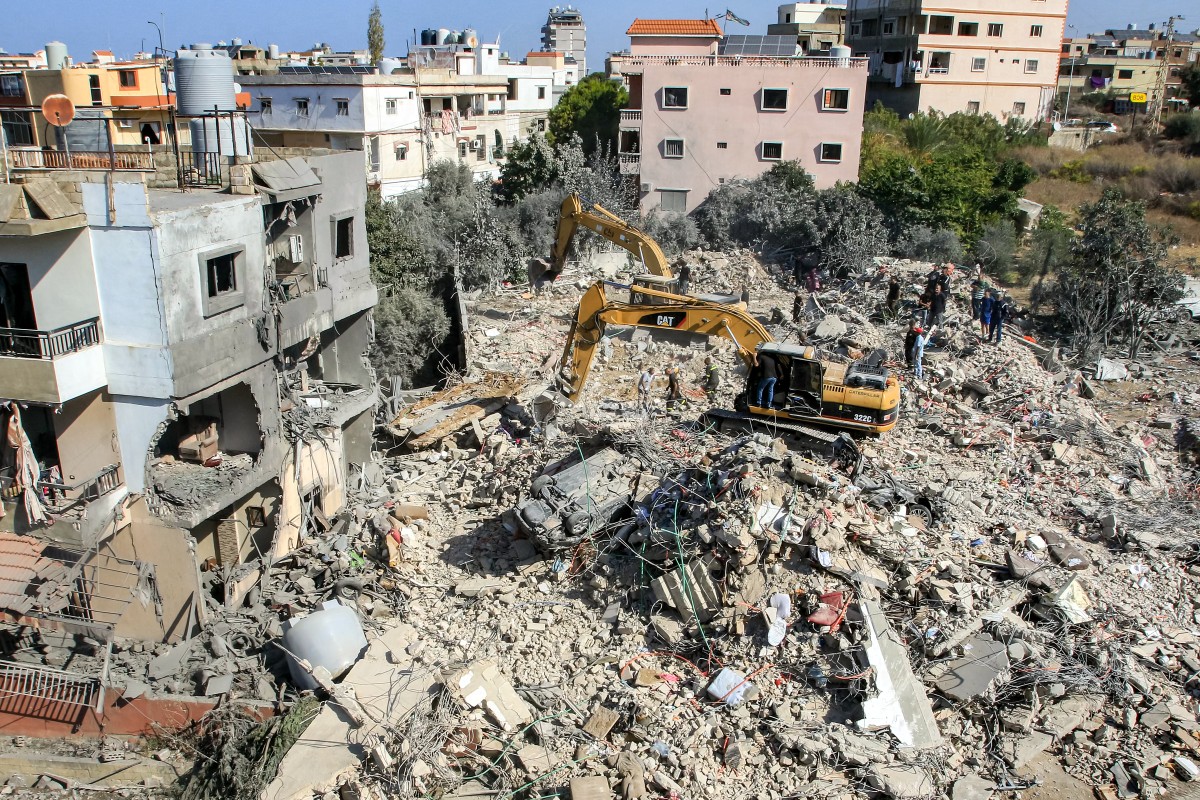Beirut, Lebanon – Israel on Sunday pressed on with its campaigns in Lebanon and Gaza, launching several deadly strikes as Prime Minister Benjamin Netanyahu visited his country’s northern border.
Netanyahu’s visit came after an air strike killed at least three people near the southern Lebanon city of Sidon, the Lebanese health ministry said, and as more bombs hit the country’s east.
“I want to be clear: with or without an agreement, the key to restoring peace and security in the north… is first and foremost to push Hezbollah back beyond the Litani River, secondly to target any attempt to rearm, and thirdly to respond firmly to any action taken against us,” Netanyahu told troops at the border, his office said in a statement.
Netanyahu’s border visit came as Israel’s military said more than 100 projectiles were fired from Lebanon into Israeli territory on Sunday. Several were intercepted, and some fell in unpopulated areas.
Hezbollah later said it also fired a barrage of missiles at an Israeli air force “technical base” in the northern coastal city of Haifa.
Israel and Iran-backed Hezbollah in Lebanon have been at war since September 23, when Israel escalated cross-border air raids after a year of tit-for-tat exchanges of fire.
A week later it sent in ground troops on “targeted raids”.
Hezbollah said it was acting in support of Palestinian militants Hamas, whose unprecedented attack against Israel on October 7 last year triggered the ongoing war in Gaza.
“The Israeli enemy’s raid on Haret Saida resulted in an initial death toll of three people killed and nine others injured,” Lebanon’s health ministry said, referring to a densely populated area near Sidon.
Lebanon’s official National News Agency (NNA) reported another Israeli strike south of Sidon, on the town of Ghaziyeh. An AFP correspondent said a child was rescued from the rubble of a residential building.
NNA said other Israeli strikes hit near a hospital in Tebnine, a town in the south Lebanon district of Bint Jbeil.
The health ministry said the hospital sustained “severe damage”, and that seven people were wounded.
Neither the Haret Saida strike nor those in Lebanon’s south were preceded by a warning to evacuate.
The health ministry also said a strike near Tyre killed two rescue workers from the Hezbollah-affiliated Islamic Health Committee.
Heavy air raids
Israel’s military did issue a warning for Lebanon’s eastern Baalbek area, saying it would attack Hezbollah-linked facilities.
An AFP correspondent later reported at least three strikes in the Baalbek area, where Hezbollah holds sway and which has seen heavy air raids over the past few days.
Also on Sunday, NNA reported the recovery of five out of 21 bodies buried under the rubble for about a week in the flashpoint southern town of Khiam.

Hezbollah on Sunday published an undated video of an underground facility dubbed “Imad 5”, showing a hatch opening and a missile pointing skywards.
Fighters are also seen moving through an apparently underground tunnel carved into the rock.
The war has killed more than 1,940 people in Lebanon since September 23, according to an AFP tally of Lebanese health ministry figures.
Israel’s military says 38 soldiers have been killed since it began ground operations in Lebanon.
Iran and Israel have also attacked each other directly, heightening fears of even wider conflict.
But Iran’s President Masoud Pezeshkian on Sunday said a potential ceasefire with its allies Hamas and Hezbollah “could affect the intensity and type of our response”.
The Islamic republic’s supreme leader Ayatollah Ali Khamenei had on Saturday warned Israel and the United States they “will definitely receive a tooth-breaking response”.
Israel has warned Iran against responding to its October 26 attack.
Sacks of flour
In Gaza, Israel’s military again reported “dozens” of militants killed in the northern Jabalia area where since October 6 it has carried out a major air and ground assault to stop Hamas regrouping.
Gaza rescuers and medics said Israeli strikes in Gaza on Sunday killed at least 30 people across the territory.
In central Gaza, people crowded to receive sacks of flour from a UN agency for Palestinian refugees (UNRWA) distribution point in Deir el-Balah.
Israel’s parliament last Monday banned UNRWA — the main aid agency in Gaza — from operating in Israel and annexed east Jerusalem, despite international objections.
If implemented, the ban would hit humanitarian work in Gaza, experts say.
It came after the United States on October 15 warned Israel it could withhold some of its billions of dollars in military assistance unless it improves aid delivery to Gaza within 30 days.
Also in Deir el-Balah on Sunday, relatives at Al-Aqsa Martyrs Hospital mourned a father and son killed during Israeli bombardment.
Hamas’s October 7 attack on Israel resulted in 1,206 deaths, mostly civilians, according to an AFP tally of Israeli official figures.
Israel’s military response against Hamas has killed 43,341 people in Gaza, a majority of them civilians, according to figures from the Hamas-run territory’s health ministry which the United Nations consider to be reliable.
Netanyahu aide suspected of secrets leak
A former spokesman for Israeli Prime Minister Benjamin Netanyahu has been detained for allegedly leaking confidential documents that may have harmed Gaza hostage deal negotiations, a court said on Sunday.
Eliezer Feldstein was detained along with three other people, including security officials, said the court in the coastal city of Rishon LeZion.
News of the case has led the opposition to question whether Netanyahu was complicit in the leak — an allegation denied by his office.
Critics have long accused the premier of stalling in truce negotiations and prolonging the war to appease his far-right coalition partners.
Israel’s domestic security agency and the army launched an investigation into the breach in September after two newspapers, British weekly The Jewish Chronicle and Germany’s Bild tabloid, published articles based on the classified military documents.
One claimed a document had been uncovered showing that then Hamas leader Yahya Sinwar — later killed by Israel — and the hostages in Gaza would be smuggled out of the territory into Egypt through the Philadelphi Corridor along the Gaza-Egypt border.
The other was based on what was said to be an internal memo from the Hamas leadership on Sinwar’s strategy to hamper talks towards the liberation of hostages.
The first document leaked turned out to be fake, and the internal memo was in fact written by lower-level Hamas militants, Israeli media reports said.
The Israeli court said the release of the documents ran the risk of causing “severe harm to state security”.
“As a result, the ability of security bodies to achieve the objective of releasing the hostages, as part of the war goals, could have been compromised,” it added.
Key opposition leader Yair Lapid told journalists on Sunday the details of “the serious security affair in Netanyahu’s office should alarm every Israeli”.
“This affair originated in the prime minister’s office, and the investigation needs to determine whether it was not under the prime minister’s orders,” Lapid added.
“According to suspicions, Netanyahu’s associates leaked secret documents and forged classified documents to undermine a possible hostage release and to build a media campaign against the hostages’ families.”
Another leading opposition figure, Benny Gantz, said: “This is not a case of suspected leaks but rather profiteering with state secrets for political purposes.”
On Friday, Netanyahu denied the allegations, saying “the document published by Bild had never arrived” at his office.
Without mentioning Feldstein by name, he said the former aide “had never taken part in security meetings or consulted confidential documents”.








